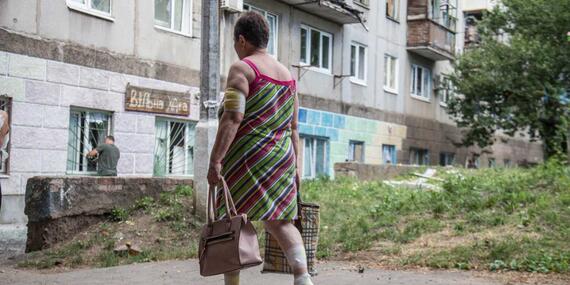Five reasons why protecting civilians is imperative

The Protection of Civilians (PoC) Week 2023 began today at UN Headquarters in New York to draw attention to the impact of conflict on civilians. Last year, the UN recorded a 53 per cent increase in the number of civilians killed across 12 armed conflicts.
Organized by OCHA, together with Belgium, Switzerland, the Center for Civilians in Conflict and the International Rescue Committee, PoC Week engages Member States, the UN and civil society in frank debates around how to improve the protection of civilians in armed conflict.
Here are 5 reasons why strengthening the protection of civilians is imperative.
1. To minimize civilian harm: Armed conflicts result in civilian death, injury and psychological wounds. In 2022, nearly 94 per cent of the victims of explosive weapons used in populated areas were civilians (in 17 conflict-affected countries and territories). Conflicts also cause the destruction of homes, schools, health-care facilities, water installations and other essential infrastructure.
2. To prevent and address hunger and famine: Last year, conflict and insecurity were the most significant drivers of high levels of acute food insecurity for around 117 million people in 19 countries and territories. Crops were destroyed, livestock stolen, land spoiled, roads blocked and farmers driven from their fields. Livelihoods were lost as food prices increased sharply.
3. To protect vulnerable groups: Women, children and people with disabilities are affected by conflict in different ways. Ensuring their protection is critical. Last year, women and girls accounted for at least 95 per cent of victims of documented sexual violence. Children were abducted, recruited, used in hostilities and deprived of an education. People with disabilities were trapped in hostilities and unable to access food, water, health care or humanitarian assistance.
4. To ensure safe access for humanitarian workers: Humanitarian workers face many overlapping challenges including hostilities, explosive ordnance, bureaucratic impediments, and Member States’ sanctions and counter-terrorism measures. This affects humanitarian activities, leaving people without the essentials they need. In 2022, 79 humanitarian workers were killed, 43 were injured and 113 were kidnapped in 17 conflict contexts. National staff represented 97 per cent of those affected. Misinformation and disinformation undermined trust and created security risks for humanitarians.
5. To prevent forced displacement and find durable solutions: In 2022, more than 100 million people were forcibly displaced due to conflict, violence, human rights violations and persecution. But even after fleeing violence, people were still not safe. They faced more violence, explosive hazards and limited access to essential services. Displaced people faced greater difficulties accessing food – a difficulty that increased each time they were displaced.
What must be done?
Aurélien Buffler, Chief of OCHA’s Policy Advice and Planning Section, explains:
“First and foremost, we need all States and parties to conflict to incorporate international humanitarian law into their laws, military manuals and training, and to adopt specific protections for vulnerable persons, such as children and persons with disabilities. We also need all States to join the new Political Declaration on Explosive Weapons in Populated Areas, and for its commitments to be translated into meaningful action.
“Second, we need unimpeded humanitarian access and the protection of all humanitarian workers and supplies. Humanitarians must be allowed to bring much-needed aid safely to those who need it the most, and their ability to engage with all parties to armed conflicts for negotiating access and promoting adherence to international humanitarian law must be encouraged. States should ensure that their sanctions and counter-terrorism measures do not negatively impact the delivery of humanitarian and medical assistance.
“Third, all States must ensure respect for international humanitarian law, including through political dialogue, training of fighters, conditioning their military support on recipients’ respect for international law, and investigating and prosecuting war crimes.”
About POC Week
PoC Week provides an opportunity to create connections, and to discuss and share knowledge and solutions to enhance the protection of civilians. It serves as a platform for bringing the voices of survivors of armed conflict to New York and actively listening to what they need and what they have to say. More information can be found here Protection of Civilians Week 2023
